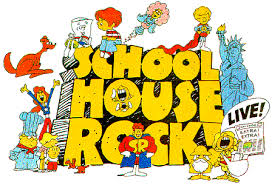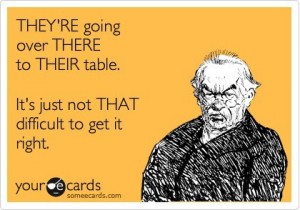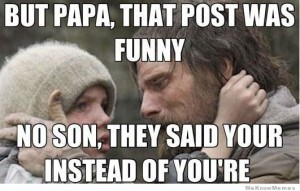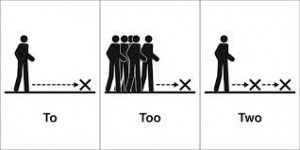First things first: Reiterating last week’s blog post, I am offering FREE, SIGNED copies of These Foolish Things to breast cancer survivors. I have walked in Boston’s Making Strides Against Breast Cancer event several times. I lost my best friend to complications of this foul thief. It is my great pleasure to strike back. If you know someone, share this post.
I am a writer (although with something in print, I can now say “I am an author.” Writer’s Digest had some article about the difference between being a “writer” and an “author” and made the distinction that of being published). I am trained as an English (Language Arts) teacher. I have a mastery of my native language, both spoken and written (typing is another story). I read a lot of books, articles, and Facebook posts. The errors in spelling and usage by people who SHOULD know better make me wonder if humans are heading back to grunts and gestures as the sole means of communication. Why should they know better? Because this is FOURTH GRADE Language Arts, people.
And, some of all y’all are PROFESSIONAL PUBLISHED AUTHORS.
ARGHHHH!!!!!
WHAT I SEE is that people sitting down to a word processing program to write rely on the Spell Check feature to catch any and all errors; therefore, they don’t need to know the words. Spell Check is my Homeboy. Same kind of thinking with not learning basic math functions like addition, subtraction, long division, and multiplication because calculators are so cheap and plentiful. (I still break out in fraction-induced cold sweats)
Bad thinking, Folks, bad thinking.
Yes, Spell Check knows how to spell a boat load of words. HOWEVER, Spell Check does not know context. Spell Check knows how to spell all the different homonyms (words that sound alike but have different spellings and meanings), but it isn’t smart enough to detect when you’re using the wrong one. We are all in trouble when it does because that means that Skynet has become aware and we will have Arnold Schwarzenegger suddenly show up looking for Sarah Connor. Buck naked isn’t his best look right now.
See?
Of course, the reliance and prevalence of Spell Check doesn’t explain so many people who cannot or do not spell “definitely” or “separate” correctly. IT’S EVEN IN YOUR FACEBOOK STATUS UPDATES FER CRYIN’ OUT LOUD!!! One of my sisters, for instance, throws that “a” into “definite” or “definitely” and when it was pointed out to her, couldn’t give a shit and in fact bitched about getting corrected.
Ohhhh-kaaay.
Anyway, you as the human in front of the word processing program have the responsibility of knowing what is right. In fact, you should have learned this in middle school, if not earlier.
I’m not kidding: for basics in Math, Language Arts, Civics, and Science, this is a worthwhile investment. Spongebob and My Little Pony may be entertaining, but this is entertaining and contains essential knowledge.
I’m going to focus on three homonym groups that are the most abused.
This group is Numero Uno, especially the use of the possessive pronoun “their” when the writer intends “they’re” (contraction of “they are”). I cringe. I really do. I reiterate: if you have spelled “their” correctly, Spell Check is not going to pick up the error because Spell Check is not programmed for CONTEXT. I’m sorry, but you have to step up on these and just learn the correct words/usage. There’s no way around it. See the grumpy man up there (correct usage)? Learn from him.
It seems like the one rule from basic Language Arts that everyone remembers is that you use an apostrophe to show possession. That’s fine, but it leads to confusion when you are dealing with pronouns. Apostrophes are an element in contractions (I’m, they’re, aren’t, isn’t, wouldn’t, ain’t). Possessive pronouns don’t have apostrophes. My, your, their, our.
Your. The possessive pronoun. Your book, your blog, your egregious writing errors.
Contractions are a shortening of two words (or labor pains that make the mother-to-be wish the time was shorter). “They are” turns into “they’re” (replacing the a with the apostrophe). “I am” becomes “I’m.” These are not possessive pronouns. They are contracted verbs. They denote action (or a state of being). So, the sentence “Your going to have fun” (and I’d like to note that Spell Check didn’t underline the “your”) SHOULD be “You’re (You are) going to have fun.”
You’re going to have to learn the difference to improve your writing.
For once, it’s not pronouns and contractions getting the abuse
To – preposition. What’s a preposition:
-
a word governing, and usually preceding, a noun or pronoun and expressing a relation to another word or element in the clause, as in “the man on the platform,” “she arrived after dinner,” “what did you do it for ?”Too – means either “also” or “excessive.” “She’s (contraction, not a possessive pronoun) covering this, too? That’s too much!”
Finally, “two”
It’s a number, pure and simple. After one and before three.
And watch yourselves: there may be a quiz.





